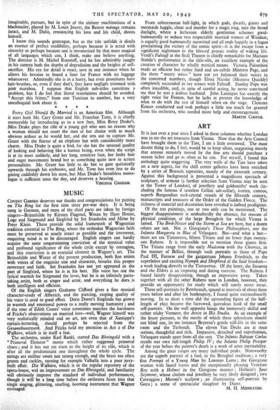MUSIC COVENT GARDEN deserves our thanks and congratulations for putting
on The Ring for the first time since pre-war days. It is being sung in German, and most of the chief parts are taken by foreign singers—Brunnhilde by Kirsten Flagstad, Wotan by Hans Hotter, Loge and Siegmund and Siegfried by Set Svanholm and Mime by Peter Klein. These provide the solid framework of Wagnerian tradition essential to The Ring, where the orthodox Wagnerian faith must be preserved as nearly intact as possible and the irreverent, enquiring mind is to be discouraged. English singers can hardly acquire the same unquestioning conviction of the mystical value and profound significance of the whole cycle except by contagion, and this conviction is an essential element in Wagner's art. The Briinnhilde and Wotan of the present production, both fine artists with voices of the requisite size and character, breathe this proper reverence and faith. Set Svanholm has not yet appeared in the part of Siegfried, where he is at his best. His voice has not the lyrical warmth for Siegmund the lover, but he is an infinitely pains- taking, artist, both as singer and actor, and everything he does is both intelligent and efficient. Of the English singers Grahame Clifford gives a fine musical character-study of Alberich, and the piercing, rasping quality of his voice is used to good effect. Doris Doree's Sieglinde has grown in warmth and emotional powep to a really moving humanity ; and if the tone of Edith Coates' voice sometimes matches the harshness of Fricka's observations on married love—well, Wagner himself was very realistically minded and no art, not even that of Xantippe's curtain-lecturing, should perhaps be rejected from the Gesamtkunstwerk. And Fricka held my attention in Act 2 of Die Walkare, which is in itself a feat. The orchestra, under Karl Rankl, started Das Rheingold with a "Primeval Element" motto which rather suggested primeval chaos ; and it has not yet risen to the height of its role, which is after all the predominant one throughout the whole cycle. The strings are neither sweet nor strong enough, and the brass too often grunts and cackles, turning for example Valhalla into a poor jerry- built affair. Die Walkare, which is in the regular repertory of the opera-house, wa§ an improvement on Das Rheingold, and familiarity will obviously improve the standard of individual performances, though it will be a long time before the orchestra fuses into that single singing, glittering, snarling, booming instrument that Wagner envisaged. From subterranean half-light, in which gods, dwarfs, giants and mermaids haggle, cheat and murder for a magic ring, into the broad daylight, where a lecherous elderly gentleman schemes good- humouredly to seduce two respectable married women of Windsor, is equally good humouredly outwitted and all ends happily in a fugue proclaiming the victory of the comic spirit—it is the escape from a significant nightmare to the blessed prosaic reality of waking life. Verdi's Falstaff at the Stoll Theatre is chiefly remarkable for Mariano Stabile's performance in the title-rOle, an excellent example of the creation of character by wholly musical means. Victoria Palombini made an efficient but rather hard and un-subtle Mistress Page, and the three "merry wives " have not yet balanced their voices in the concerted numbers, though Elena Nicolai (Mistress Quickly) completely succeeded in her scenes with Falstaff. Stanley Pope was often inaudible, and, in spite of careful acting, he never convinced me that he was a jealous husband. John Larinigan has exactly the right voice for Fenton, but he lacks at present the knowledge of what to do with the rest of himself when on the stage. Clemens Krauss conducted and took perhaps a little too much for granted from his orchestra, who needed more help and encouragement.
MARTIN COOPER.










































 Previous page
Previous page